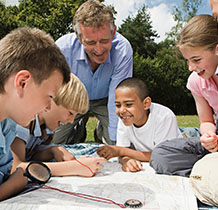Resource Database

Click on a topic or use the search box below to look for a listing:
There are 488 resources. Displaying 10 resources per page.
Published by the National Child Traumatic Stress Network in 2008, this toolkit provides information and resources to help educators support students who have experienced trauma. The toolkit includes a fact sheet and strategies that educators can use with different age groups.
View Resource
Diverse Learners
High-quality expanded learning programs can help youth in middle and high school avoid risky behavior and stay on track for graduation. Yet many cities struggle to provide sufficient afterschool and summer learning opportunities for older youth that are accessible and relevant to their interests. To address these challenges, the National League of Cities’ Institute for Youth, Education, and Families has published City Strategies to Engage Older Youth in Afterschool Programs. The guide identifies four strategies that city leaders can use to increase afterschool program participation among older youth: coordinate systems to support effective service delivery; ensure programs are of high quality; offer a wide variety of relevant program options; and promote college attendance and workplace readiness.
View Resource
Diverse Learners
Science NetLinks, a project of the Directorate for Education and Human Resources Programs of the American Association for the Advancement of Science, has several free afterschool science lessons on its website. Hands-on lessons include creating a geyser, constructing models to learn about balance, using marbles and coins to understand the concept of chance, and other fun activities. Each lesson includes a facilitator page, as well as online and printable pages for kids.
View Resource
Academic Enrichment
This working paper by a team from the Teachers College at Columbia University reviews roughly five decades of research around local, cross-sector collaborations. The authors examine key obstacles collective impact efforts have faced but note that current efforts in education may have better outcomes for several reasons: the notion that “schools can do it alone” has receded; new players, including mayors and city agencies, have become factors in education policy; many states and districts now have more sophisticated systems for collecting and analyzing student data; and cities are embracing “the new localism”-the idea that they, rather than the federal government, are the best arena for creative solutions to big problems.
View Resource
Published by the National League of Cities’ Institute for Youth, Education, and Families in 2010, this guide describes three key strategies that city leaders can use to generate support for access to high-quality out-of-school time activities. The guide also highlights a broad range of examples of how cities have successfully implemented each strategy, from partnerships with universities to coordinated communications plans.
View Resource
When budgets are tight, successful partnerships allow organizations to leverage resources that expand and enrich young peoples’ lives. Meaningful Linkages Between Summer Programs, Schools, and Community Partners: Conditions and Strategies for Success, a short research profile from the National Summer Learning Association, is based on in-depth interviews with 11 summer programs that have successfully forged dynamic linkages between summer programs, schools, and community organizations. The report provides guidance and examples for developing and managing effective summer learning partnerships in your community.
View Resource
Amid growing national interest in strengthening children’s “soft” or social-emotional skills as essential for learning, work, and life, a new study from Search Institute highlights the power of family relationships as a critical, but often neglected, factor in the development of character strengths in children. The study argues that too many family engagement efforts are about getting families to support what an institution does, like a school or youth program, and “overlook the one thing about which parents care deeply and that can powerfully benefit their children’s development: relationships in the home.” The findings challenge schools, organizations, and coalitions to rethink and reinvest in family engagement as a crucial strategy for working together for children’s success.
View Resource
Afterschool Matters is an e-magazine produced by the National Institute on Out-of-School Time biannually. The spring 2015 issue has articles on a range of topics: supporting girls in taking positive risks, planning professional development, programs for high school youth, STEM programming, and out-of-school time work with boys and young men of color.
View Resource
Afterschool Enrichment
Kids on the Move: Afterschool Programs Promoting Healthy Eating and Physical Activity is a special report completed as part of the Afterschool Alliance’s study, America After 3 PM. The publication concentrates on parents’ reports of efforts made by afterschool programs to help improve the health and physical fitness of children and youth around the country. It also describes areas where afterschool programs can better meet the needs of students and families when it comes to health and wellness and outlines steps afterschool programs can take to help make positive change for students’ overall health.
View Resource
Afterschool Enrichment
The beginning of the school year means a new beginning-and new students. This blog post from Educational Technology and Mobile Learning lists several ice breaker activities that educators can use to help students get to know each other. There is also an infographic to print or share on social media.
View Resource
Afterschool Enrichment
There are 488 resources. Displaying 10 items per page.
- Academic Enrichment
- Afterschool Enrichment
- Classroom Management
- College and Career Readiness
- Diverse Learners
- Family and Community Engagement
- Program Management
- Social-Emotional Learning
- Sustainability
- Technology
Subscribe to the Illinois Quality Afterschool newsletter and resource bulletin.
